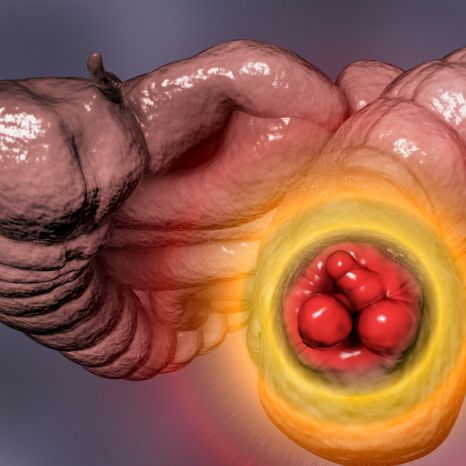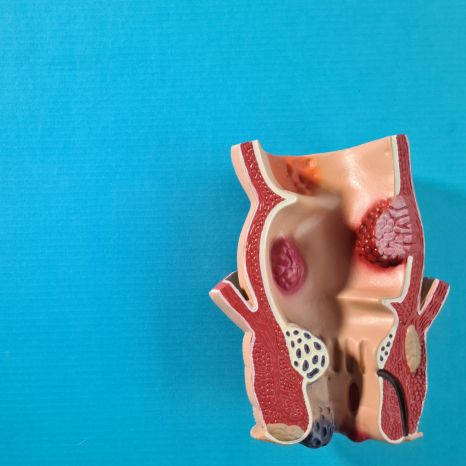Is mucus and blood in stool a concern?
Here we discuss what mucus and blood in bowel movement can indicate, along with the causes, treatments, and when to consult a doctor.
Is mucus and blood in stool a concern?
Here we discuss what mucus and blood in bowel movement can indicate, along with the causes, treatments, and when to consult a doctor.

What does the presence of mucus in stools indicate?
A minor presence of mucus in stool is typically considered normal, as it serves to lubricate and maintain the moisture of the colon lining. However, if you observe an unusual increase in the amount of mucus in your stool, especially if it becomes a regular occurrence or is accompanied by other concerning symptoms such as bleeding or changes in bowel habits, it is advisable to consult with your doctor.
Excessive mucus in stool, particularly when coupled with diarrhoea, could be indicative of certain intestinal infections. On the contrary, the presence of bloody mucus in stool or mucus accompanied by abdominal pain may suggest more serious conditions such as Crohn’s disease, ulcerative colitis, or even cancer.
What does the presence of mucus in stools indicate?
A minor presence of mucus in stool is typically considered normal, as it serves to lubricate and maintain the moisture of the colon lining. However, if you observe an unusual increase in the amount of mucus in your stool, especially if it becomes a regular occurrence or is accompanied by other concerning symptoms such as bleeding or changes in bowel habits, it is advisable to consult with your doctor.
Excessive mucus in stool, particularly when coupled with diarrhoea, could be indicative of certain intestinal infections. On the contrary, the presence of bloody mucus in stool or mucus accompanied by abdominal pain may suggest more serious conditions such as Crohn’s disease, ulcerative colitis, or even cancer.

What are the causes of the formation of mucus and blood in stool?
The presence of mucus and blood in bowel movements can be indicative of various underlying health conditions. Mucus, a gel-like substance, is normally present in stools to maintain intestinal moisture, while blood can arise from different parts of the digestive tract.

Haemorrhoids
Swollen blood vessels in the rectum or anus can cause bleeding during bowel movements.

Anal fissures
Small tears in the lining of the anus, often caused by passing tight bowel movements.

Inflammatory bowel disease (IBD)
Crohn’s disease or ulcerative colitis can cause inflammation in the digestive tract.

Gastrointestinal infections
Infections can lead to symptoms like diarrhoea, blood in stool, and increased mucus.

Diverticulitis
Inflammation or infection of small pouches that can form in the walls of the colon.

Colorectal polyps or cancer
The presence of blood in the stool can be a sign of colorectal issues, such as polyps or cancer.

Gastrointestinal bleeding
Bleeding from higher up in the digestive tract, such as the stomach or small intestine.

Digestive tract trauma
Injuries or trauma to the digestive tract can lead to excessive mucus and blood found in stool.
It’s crucial to see a healthcare professional if you notice mucus and blood in your stools, especially if it becomes a recurrent or persistent issue.
Only a gastrointestinal specialist can provide a proper diagnosis and recommend appropriate treatment based on your specific symptoms and medical history.
Ignoring such symptoms may delay the identification and management of potential underlying health issues.

How can mucus and blood in stool be diagnosed?
In the process of diagnosing the cause of bloody mucus during bowel movements, your healthcare provider will conduct a thorough evaluation. They will inquire about your symptoms, including when they began, and delve into your medical history, family history of digestive conditions, and current medications.
A physical examination will likely be performed, potentially involving the manual examination of the rectum to detect any signs of inflammation or abnormalities. Based on your medical history, symptoms, and physical exam findings, your healthcare provider may recommend diagnostic tests such as blood or stool tests. Another possibility is a rectal culture, where a swab is used to collect a sample from your rectum to check for the presence of bacteria.
For a more in-depth investigation of your intestines and potential sample collection, your healthcare provider might suggest an endoscopic procedure, such as a colonoscopy or flexible sigmoidoscopy. A colonoscopy examines the entire lining of your colon, while a flexible sigmoidoscopy focuses on the rectum and lower colon. These procedures can provide valuable insights into the source of the issue and guide appropriate treatment decisions. It’s essential to collaborate with your healthcare provider and undergo the recommended tests to identify and address any underlying health concerns.
How can mucus and blood in stool be diagnosed?
In the process of diagnosing the cause of bloody mucus during bowel movements, your healthcare provider will conduct a thorough evaluation. They will inquire about your symptoms, including when they began, and delve into your medical history, family history of digestive conditions, and current medications.
A physical examination will likely be performed, potentially involving the manual examination of the rectum to detect any signs of inflammation or abnormalities. Based on your medical history, symptoms, and physical exam findings, your healthcare provider may recommend diagnostic tests such as blood or stool tests. Another possibility is a rectal culture, where a swab is used to collect a sample from your rectum to check for the presence of bacteria.
For a more in-depth investigation of your intestines and potential sample collection, your healthcare provider might suggest an endoscopic procedure, such as a colonoscopy or flexible sigmoidoscopy. A colonoscopy examines the entire lining of your colon, while a flexible sigmoidoscopy focuses on the rectum and lower colon. These procedures can provide valuable insights into the source of the issue and guide appropriate treatment decisions. It’s essential to collaborate with your healthcare provider and undergo the recommended tests to identify and address any underlying health concerns.

What kind of tests will be conducted for mucus and blood in stool?
When investigating the presence of mucus and blood in bowel movements, healthcare providers may recommend various tests to determine the underlying cause. These tests can include:
Stool tests
Stool tests may include faecal occult blood tests (FOBT) to detect hidden blood as well as cultures to identify potential infections or parasites.
Blood tests
Blood tests are conducted to check for signs of inflammation, infection, or other abnormalities and may provide clues about the underlying condition.
Colonoscopy
Visual examination of the entire colon and rectum to identify abnormalities, take tissue samples for biopsy, and even remove polyps.
Endoscopy
In some cases, an upper endoscopy may be performed to examine the upper digestive tract if symptoms suggest issues in the bottom of the digestive tract.
Imaging studies
X-rays, CT scans, or MRI scans may be recommended to get a detailed view of the gastrointestinal tract and identify any structural abnormalities.
Rectal examination
A physical examination of the rectum, which may include a digital rectal exam, can provide information about the condition of the rectum and anus.
The specific tests conducted will depend on the patient’s symptoms, medical history, and the healthcare provider’s clinical judgement. It’s important to follow the guidance of the healthcare team to determine the most appropriate diagnostic approach for each case.
When should a doctor be consulted for mucus and blood found in stool?
If you notice mucus and blood in your stool, it’s advisable to consult a doctor promptly, especially under the following circumstances:
Persistent symptoms
If the presence of mucus and blood in your stool persists for more than a few days or becomes a recurring issue, seeking medical attention is essential.
Changes in bowel habits
Any sudden or significant changes in your bowel habits, including the appearance of mucus or blood, should be discussed with a healthcare professional.
Abdominal pain
If you experience abdominal pain along with mucus and blood in your stool, it could indicate a more serious issue and prompt medical evaluation is crucial.
Risk factors
If you have a family history of colorectal cancer and a personal history of inflammatory bowel disease, it’s important to be proactive in seeking medical advice.
Other concerning symptoms
If you have symptoms such as unexplained weight loss, fatigue, or persistent diarrhoea, you must consult a doctor for a comprehensive evaluation.
Age and screening guidelines
Age-appropriate cancer screening guidelines are crucial, which is why routine screenings are recommended starting at a certain age or earlier.
Remember that only a healthcare professional can provide a proper diagnosis and recommend an appropriate course of action based on your individual health history and symptoms. Ignoring or delaying seeking medical attention for these symptoms may result in a delayed diagnosis and treatment of potentially serious conditions.
Consult a gastrointestinal specialist today
It’s crucial to prioritise your health and seek professional medical advice if you experience any unusual or persistent changes in your bowel movements or stool composition.
Your doctor can conduct a thorough examination, order relevant tests, and provide personalised guidance based on your gastrointestinal symptoms. Ignoring or self-diagnosing symptoms, like mucus and blood or yellow mucus in stool, may lead to delayed treatment of potentially serious conditions.

Consult a gastrointestinal specialist today
It’s crucial to prioritise your health and seek professional medical advice if you experience any unusual or persistent changes in your bowel movements or stool composition.
Your doctor can conduct a thorough examination, order relevant tests, and provide personalised guidance based on your gastrointestinal symptoms. Ignoring or self-diagnosing symptoms, like mucus and blood or yellow mucus in stool, may lead to delayed treatment of potentially serious conditions.



FAQs
Is it normal to have mucus in stool?
A small amount of mucus in stool is generally considered normal, as it helps lubricate the colon lining. However, an increased amount, especially if accompanied by other symptoms, should be evaluated by a healthcare professional.
How is mucus and blood found in stool treated?
Treatment depends on the underlying cause. It may involve lifestyle changes, medications, or surgical interventions. Proper diagnosis by a healthcare professional is crucial for determining the appropriate treatment plan.
Are there preventive measures for mucus and blood in stool?
Maintaining a healthy lifestyle, including a balanced diet with adequate fibre, staying hydrated, and undergoing recommended screenings based on age and risk factors, can contribute to digestive health. However, specific preventive measures depend on the underlying cause.
